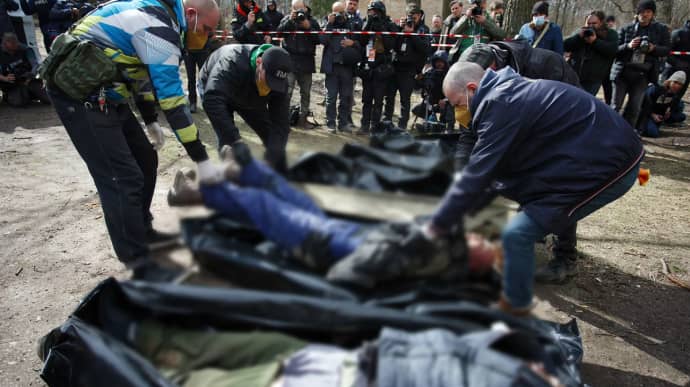Some bodies were so badly mutilated that sex could not be determined: Ukrainian police recall de-occupation

Virtually every liberated city in Ukraine that the police entered was one vast crime scene, Maksym Tsutskyridze, First Deputy Chief of the National Police and Head of the Main Investigative Department (MID) of the National Police of Ukraine, has said.
Source: Tsutskyridze in a comment to Ukrinform regarding the start of Russia’s full-scale war in 2022
Quote from Tsutskyridze: "Practically every de-occupied city was one vast crime scene where we had to not only examine the bodies, but also establish the circumstances of their deaths, identify direct witnesses, and determine who was responsible for these crimes. And all of this took place amid buildings destroyed by missiles and plundered by looters, on mined territory where, besides us, municipal workers had also arrived, eager to clean up after the horror wrought by the Russians, yet inadvertently risking the removal of crucial evidence needed for investigations."
Details: Tsutskyridze emphasised that it was critically important for police officers to document everything – from a spent shell casing on the street to inspecting the premises where the Russians had been stationed.
He explained that some cases have been solved based on a single fingerprint, as law enforcement officers rely on any piece of physical evidence. Thousands of investigators and forensic experts from all over the country were mobilised for this task, all united by one goal: to record every atrocity committed so that no war criminal would escape accountability.
Thanks to this meticulous documentation, Tsutskyridze noted, the investigators have preserved vital testimonies and evidence which have already formed the basis for thousands of indictments and hundreds of convictions of Russian war criminals.
He recalled that it was in Kyiv, Sumy and Chernihiv oblasts in the spring of 2022 that police investigators first began documenting Russian atrocities.
Quote: "It was a horrific experience, one I wouldn’t wish upon any colleague in the world. These are terrible memories. It was the first time we had encountered such brutal mass crimes against humanity, the aftermath of the terror that had been inflicted on children and civilians. But we had no time to process it – we had to not only document Russian crimes, but also to investigate them as professionals."
By the time the police entered the liberated areas of Kharkiv and Kherson oblasts in the autumn of 2022, they had developed clear protocols.
Quote: "The situation after the Russians left was the same everywhere: local residents had been without water, gas or electricity for months, and there was no mobile communication. Pharmacies, petrol stations and shops had been completely looted, hundreds of buildings had been destroyed or damaged. People were living in terrible conditions, without food or medicine, in constant fear that they might become the occupiers’ next target. And they had good reason to fear that."
Tsutskyridze cited Bucha, where the bodies of unarmed civilians who had been killed simply for trying to find food or escape the occupied city lay on the streets for weeks. Some had been buried in makeshift graves.
He added that in Kharkiv Oblast, the Russians had disposed of the bodies in a more systematic manner.
Quote: "In Izium, the Russian-appointed officials hastily buried those who had been murdered, tortured to death or killed in enemy attacks in a forest, in an old cemetery that had not been used for burials for years. The closer you got to the forest, the stronger the stench of death became. It was so overwhelming that when I returned to the car after inspecting the site, my driver vomited – the smell that had seeped into my clothes was so strong."
Law enforcement officers discovered 448 bodies of civilians and military personnel in the mass graves in Izium.
Quote: "Neither I nor anyone else present had ever seen so many dead bodies at once. Their conditions varied – some had died naturally, while others had been so brutally mutilated by the occupiers that it was impossible even to determine their sex."
The only bright memory amid those dark days, Tsutskyridze said, was the joy with which the locals welcomed the Ukrainian troops and police as they arrived in the liberated territories.
Quote: "People said that with us, life had returned to them. The citizens’ gratitude kept us going everywhere. In every corner of the country, we strengthened their trust with our constant presence and assistance, trying to resolve every issue they faced – even those beyond our jurisdiction – remaining in touch at all times and always responding to calls, despite all the risks."
Tsutskyridze noted that people reciprocated with unprecedented support for the police, which reached historic highs at the start of the full-scale war.
Quote: "In the past, our investigators would visit those they had saved during the war to wish them well at Christmas, and they found that even though time had passed, people remembered everything and were deeply grateful."
Support Ukrainska Pravda on Patreon!